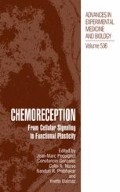Abstract
The neuroepithelial bodies (NEB) are specialized pulmonary structures composed of clusters of innervated amine-and peptide-containing cells, widely distributed within airway mucosa of human and animal lung (Lauweryns et al., 1972). NEB cells are preferentially located at or near airway bifurcations, a site ideally suited for sensing changes in airway gas concentration. NEB cells express a membrane-bound 02 sensor protein, NADPH oxidase, which appears to function in association with sensitive K+ channels (Wang et al., 1996; Fu et al., 1999, 2002). In these specialized receptor cells, hypoxia inhibits Ca2+-lependent and Ca2+-independent K+ channels, leading to an increase in cell firing or a facilitation of membrane depolarization (Youngson et al., 1993). These events are proposed to stimulate neurotransmitter release, which in turn activates second order vagal chemoafferent neurons (Fu et al., 2001). The candidate neurotransmitters involved in chemotransduction of hypoxia stimulus in NEB cells are similar to those proposed for the carotid body glomus cells i.e., serotonin (5-HT), acetycholine (ACh) and ATP (Zhang and Nurse, 2000). Earlier studies reported hypoxia-induced 5-HT release from NEB cells in vivo in neonatal rabbits, and in cultures of NEB cells isolated from
Access this chapter
Tax calculation will be finalised at checkout
Purchases are for personal use only
Preview
Unable to display preview. Download preview PDF.
References
Brouns, I., Adriaensen, D., Burnstock, G., Timmermans, J.P., 2000 XXX, AmJ. Respir. Cell Mol. Biol. 23:52-61.
Cutz, E. Spiers, V. and Yeger, H. 1993, XXX, Ana. Rec. 236:41-52.
Cutz, E. and Jackson, A. 1999, XXX, Respi.r Physiol. 115:201-14.
Fu, X.W., Nurse, C.A., Wang, Y.T. and Cutz, E. 1999, XXX, J. Physiol. 514:139-150.
Fu, X.W., Wang, D., Pan, J., Farragher, S.M., Wong, V. & Cutz, E., 2001, XXX, Am. J. Physiol 281, L931-940.
Fu, X.W., Nurse, C.A., Wong, V and Cutz, E., 2002, XXX, J.Physiol, 539, pp 503-510.
Fu, X.W., Jackson, A., Wang, D. and Cutz, E. 2001, XXXhttp:/www.neur.affil.edu/post/AAA.html
Lauweryns, J.M, VanLommel A, Dom RJ., 1985, XXX, J. Neurol. Sci 195; 67:81-92.
Lauweryns, J.M., Cokelaere, M. & Theunyck, P., 1972, XXX,Zeitschrift Fur Zellforshung 135,569-592.
Maus, ADJ., Pereira, E. FR., Karachunski, P.I., Horton, R.M., Navaneetham, D., Mackin, K., Cortes, W.S., Albuqerque, E.X. and Conti-Fine, M. 1998, XXX, Molecular Pharmacology 54:779-788.
Shirahata, M. and Sham, J S K., 1999, XXX, Jap. J.Physiol. 49: 213-228.
Sekhon, H.S, Jia, Y., Raab, R., Kuryatov, A., Pankow, J. F., Whitsett, J.A., Lindstrom, J. and Spindel, E.R., 1999, XXX, J. Clin. Invest. 103:637-647.
Sunday, M.E. and Cutz, E., 2000, Role of neuroendocrine cells in fetal and postnatal lung. In Endocrinology of the Lung (Mendelson CR,ed) Humana Press, Totowa, N.J. p 299-336.
Wang, D., Youngson, C, Wong, V., Yeger, H., Dinauer, M, Vega-saenz de miera, E., Rudy, B, & Cutz, E., 1996, XXX, Pro.Nat.Acad.Sci. USA 93, 13182-13187.
Youngson, C., Nurse, C.A., Yeger, H. & Cutz, E., 1993, XXX, Nature 365, 153-155.
Zhang, M., Zhong, H., Vollmer, C. and Nurse, C.A.., 2000, XXX, J. Physiol, 525 pp 143-158.
Zhang, M. and Nurse C.A., 2000, XXX, Brain Res.872:199-203.
Author information
Authors and Affiliations
Editor information
Editors and Affiliations
Rights and permissions
Copyright information
© 2003 Springer Science+Business Media New York
About this paper
Cite this paper
Cutz, E., FU, X.W., Nurse, C.A. (2003). Ionotropic Receptors in Pulmonary Neuroepithelial Bodies (NEB) and their Possible Role in Modulation of Hypoxia Signalling. In: Pequignot, JM., Gonzalez, C., Nurse, C.A., Prabhakar, N.R., Dalmaz, Y. (eds) Chemoreception. Advances in Experimental Medicine and Biology, vol 536. Springer, Boston, MA. https://doi.org/10.1007/978-1-4419-9280-2_20
Download citation
DOI: https://doi.org/10.1007/978-1-4419-9280-2_20
Publisher Name: Springer, Boston, MA
Print ISBN: 978-1-4613-4873-3
Online ISBN: 978-1-4419-9280-2
eBook Packages: Springer Book Archive

